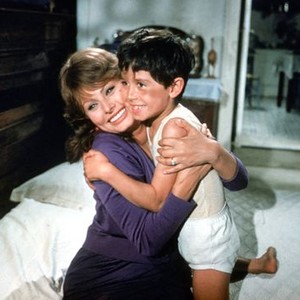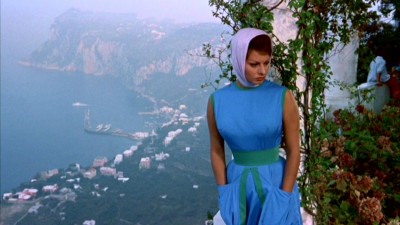
I am embarrassed to admit that I had never seen a Sophia Loren film until I watched “It Started in Naples,” earlier this week. Of course, I knew who Sophia Loren was! I don’t remember how or when I was first introduced to her, but I knew she was something special. I assumed it was mostly because of her beauty. She was breathtaking in an earthy, stunning way. She also revealed a beauty to the American public that was little known at this time. Most actresses of this time followed a cookie cutter pattern when it came to appearance and were usually pretty “WASP” looking. And then, there was someone like Sophia Loren. She proudly displayed her Italian heritage and ethnicity in a way no one else really ever had.
The movie “It Started in Naples,” followed along a common theme that we have been noticing in many movies about Italy. What is the meaning of life? What is important in life? The differences between American expectations of life and Italian expectations of life are highlighted. Mike, played by Clark Gable, strives for “opportunity.” When he arrives at Naples and then Capri, he is set on his goal—which is to turn his newfound nephew “Nando” into an American. In other words, he wants to “clean him up.” Get him to school. Take away his freedom. Teach him to play baseball and drink ice cream sodas. Nando is half American, after all! Mike’s conventions have made him to be appalled at the way Lucia, who is Nando’s aunt and Mike’s sister-in-law, is raising her nephew after her sister and his brother’s untimely death. She’s a burlesque dancer, full of raw emotion and a bit “rough around the edges” compared to an American woman of that time. In the film, Mike’s fiancée is contrasted with Lucia, every time she calls him. We get the sense she is uptight and quite dull—and as time goes on, it’s apparent that Mike finds himself bored with her when life is full of excitement and passion with Lucia. Mike had been raised to lead a sort of life that was straight as an arrow. Being in Italy upended all of that.
I can only imagine what an American audience in 1960 thought of Nando! Played by Carlo Angeletti, he was a highlight of the movie. As a young child, he had such a deep wisdom from living a carefree life. I think we all realize from watching the movie that even as he was wild and out of the ordinary (ok, he smoked a few too many cigarettes, haha!) he had a confidence, a maturity, as well as a sweet innocence. And this was all because of the one thing that Lucia gave abundantly—love.

It is difficult to watch “It Started in Naples” without reveling in the scenery and the music. This movie was for ALL of the senses. In fact, we all left the library with a deep desire for spaghetti! And thankfully my daughter had a plate of spaghetti waiting for me when I got home. The scenes from Capri are breathtaking and tell their own story. For how can we continue to be uptight and set in our ways when confronted by those ancient rugged Tyrrhenian Sea views? There is a heart thumping drama to the cove-studded coastline. All of life is a party—it seems—at Capri.

The music was also fun and filled with life. It truly set the mood for love. Of course, the contrast between Americans and Italians was again materialized in the epic song, “Tu vuo fa L’americano.”
I often wonder how my Italian American family must have reacted to this film. My mother has told me that there was a sudden interest in all things Italian at this time. Many Italian Americans were taking their first trip back to their homeland. They had made themselves into Americans. When they arrived at their hometowns, everyone rushed to see “the Americanos.” How had they changed? Had they become rich? My great grandparents took an ambitious trip home to Italy, at about the time of this movie and couldn’t wait to come back to New York. Italy had changed. And so had they.
After the movie ended, we all discussed what we thought may have happened afterwards. The entire time I rooted for the possibility that Nando would ultimately stay with Lucia in Italy. I felt coming to America would change him. It would kill his spirit. And so what if he ended up driving a cart in Capri the rest of his life? I think, in the end, that would be a pretty good life. And maybe the “opportunity” to be happy and fulfilled is just as important (if not more!) than having a good job and a lot of money.

